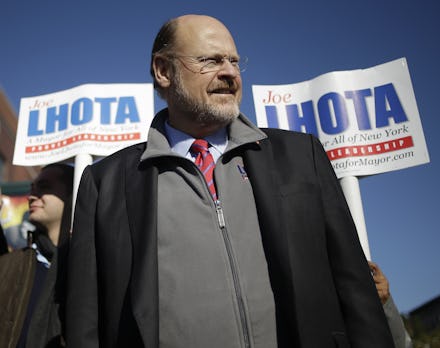Data Visualization Never Gave NYC Democrats So Much Joy

In the aftermath of Bill de Blasio's stunning 49-point victory over former MTA commissioner Joseph Lhota, New York Republicans are still reeling over their loss. New analysis reveals that last Tuesday's mayoral election is the New York GOP's worst defeat in nearly 30 years.
Not only did Lhota barely manage to get 24% of the vote, he's also on track to have raised less money than any major party New York mayoral candidate since 1989. Lhota, a former Giuliani aide, was boosted considerably by his former boss's endorsement. Party elites unquestioningly went along with Rudy's pick despite Lhota's proven fundraising difficulties dating back to the primary season.
The last time New York Republicans were defeated so soundly was in the 1985 general election when Democrat Ed Koch bested Republican Diane McGrath 78% to 9%. McGrath, an unimaginative candidate, failed to inspire confidence in voters and was unable to match Koch’s fundraising abilities, a scenario that appears to have repeated itself this year.
During the latest disclosure period running from Oct. 1 through Oct. 21, de Blasio outraised Lhota nearly five to one, bringing in $3.7 million compared to Lhota’s $700,000. During the primaries, former mayoral candidate John Catsimatidis repeatedly called into question Lhota’s fundraising abilities, warning that the Democratic nominee would coast to an easy victory without a targeted multimillion dollar media blitz, the same strategy that had propelled Republican Michael Bloomberg’s repeated electoral successes.
In 2001, Michael Bloomberg won the mayoral election as a Republican only after spending $73.9 million of his fortune to defeat Mark Green to succeed Rudy Giuliani. In doing so, he broke all previous records, and his profligacy would continue in his re-election campaigns. In 2005, he spent $84.6 million, and in 2009, he shelled out a mind-boggling $108.3 million to win his third term.
Joseph Lhota, in contrast, raised a paltry sum of $3.4 million through Oct. 21, according to filings obtained from the New York State Board of Elections. De Blasio raised nearly twice as much in this same period — $6.5 million. In fact, Lhota appears to be on track to have spent the least amount of money of any losing Democratic or Republican mayoral candidate since 1989.
Each of Mayor Bloomberg’s losing Democratic opponents — Mark Green in 2001, Fernando Ferrer in 2005, and Bill Thompson in 2009 — managed to significantly outraise Lhota, spending $16.2, $9.2, and $13.1 million, respectively, according to data obtained from the New York City Campaign Finance Board.
In choosing Joe Lhota over self made billionaire John Catsimatidis in the September primary, New York Republicans appear to have been setting themselves up for defeat. While there remain serious ethical questions about the substantial role of money in modern politics, it remains clear that Catsimatidis, with his $6 billion fortune, would have been more likely to pull off a Bloomberg, and at the very least give de Blasio a competitive run for his money.
In the aftermath of Bill de Blasio’s victory, many New York Republicans find themselves feeling shortchanged. While Bloomberg established a solid precedent of outraising his Democratic opponents by as much as four to ten times in his three campaigns, Lhota was barely able to raise half as much as de Blasio.
Did the party elites’ preference for a Harvard-educated technocrat and their dislike of a college dropout and self-made billionaire from Nisyros by way of Harlem lead to the party’s worst defeat in nearly three decades? Most political analysts agree that Mayor Giuliani’s endorsement played a critical role in helping Lhota eke out a narrow 52% to 41% victory over Catsimatidis in September’s primary, a decision that Giuliani may be regretting. Was this a case of nepotism gone awry, with Giuliani’s desire to support one of his former aides outweighing the best interests of the Republican Party?